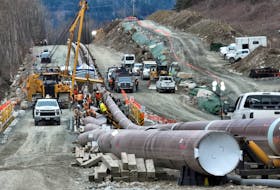OTTAWA — Environmentalists are raising the alarm over a suite of more than 250 amendments proposed for the Liberal government’s environmental review legislation, warning the industry-inspired changes could alter the bill beyond recognition.
On Monday evening the Senate energy committee will begin combing through as many as 300 proposed amendments to Bill C-69, which would overhaul the environmental review process for major projects like oil pipelines and nuclear facilities. The committee now has just three days to consider several packages of proposed amendments from both Conservative and Independent senators which, if accepted, would need to be sent back to the House of Commons for approval.
But environmentalists say the proposed changes would effectively wipe away some of the most critical environmental considerations in the bill, tipping the scales in favour of industry. They are focusing their criticism on the upper chamber, saying senators have folded to industry concerns in their study of Bill C-69.
“We haven’t got a sober second thought, we’ve got a complete re-writing,” said Josh Ginsberg, lawyer for Ecojustice.
He accused Conservative senators of taking a “copy and paste” approach to their amendments of the bill, after they put forward a number of proposed changes last week that directly reflected the demands of two oil and gas lobby groups.
“I’m concerned about the extent to which the oil and gas industry has influenced this process, and has dominated this process,” Ginsberg said.
A number of proposed amendments put forward by the Independent Senators Group are either fully or partially supported by the oil and gas industry, according to a document obtained by the National Post, presenting a real possibility that Bill C-69 is sent back to the House of Commons with major changes. In a review of 26 Independent amendments, the Canadian Association of Petroleum Producers (CAPP) fully supported three amendments, partially supported 10, and rejected 13.
The oil and gas sector began heaping criticism onto Bill C-69 shortly after it was introduced, saying it threatens to stop any major pipeline project from being built. Some argue that passage of the bill would add to constraints that have already hindered the construction of major oil pipelines, including the Trans Mountain expansion project now owned by the federal government. A number of provincial leaders including Alberta Premier Jason Kenney have also blasted the bill.
Environmental groups say those concerns are overblown, and that the proposed amendments threaten to dilute the underlying environmental thrust of the bill.
“This could weaken the whole point of environmental assessment, which is to consider climate impacts in their totality,” said Nichole Dusyk, senior analyst at Pembina Institute.
The heaviest criticisms of the bill have almost exclusively come from the oil and gas sector. Other interest groups representing the mining, hydro power and nuclear generation industries, for example, were broadly supportive of Bill C-69, and proposed only minor amendments.
Adding to environmentalist worries, senators will soon come up against their May 16 deadline to complete a final report on the legislation, forcing them to sift through hundreds of line-by-line amendments in just a few days.
“I honestly have no idea how they’re going to get through this,” Dusyk said.
Last week Conservative Senator Michael MacDonald, deputy chair of the energy committee, put forward a package of amendments that mirrored the proposed changes from CAPP and the Canadian Energy Pipeline Association (CEPA). They also included proposed changes from some provinces.
Some senators pushed back against a decision last week to include those amendments in the clause-by-clause study of Bill C-69, saying it was directly opening the door to industry demands.
“We are senators, not stenographers,” Independent Senator Yuen Pau Woo told the committee.
Environmental groups say the bill strikes a balance between commercial and industrial interests in its current form.
“It’s not like environmentalists loved the new bill,” said Keith Stewart, senior strategist with Greenpeace Canada. “We didn’t get everything we wanted — we got half of what we wanted, industry got half of what they wanted. And now they’re trying to take the whole enchilada.”
Environment Minister Catherine McKenna has said unequivocally that projects under Bill C-69 would not force regulators to consider downstream emissions in their reviews, a key concern from industry groups. However, the bill currently requires regulators to consider how a project fits with Canada’s Paris climate targets, which some say could provide reason to reject any project that encourages fossil fuel development.
Canada is currently projected to fall short of its Paris commitments to reduce greenhouse gas emissions 30 per cent below 2005 levels by 2030.
The amendments put forward by Independent senators are less ambitious in their scope than Conservative ones, but still propose substantial alterations to the bill in their totality.
One amendment, for example, would make it a central aim of the bill to consider investor certainty and economic opportunities in the review of a major project. That change would add several new industry-made requirements to the current writing of the bill, which states that regulators must simply protect the “environment, and the health, social and economic conditions” resulting from a given development.
That amendment was supported by CAPP, according to the review of amendments seen by the National Post, suggesting it could be included in the committee’s final report.
Another would take away the Environment minister’s ability to suspend time limits on a project review, and instead pass that power exclusively to the Impact Assessment Agency of Canada (IAAC), which operates under Environment Canada. Still another would ensure that a regulator weighs how “significant” are the adverse environmental impacts of a project, rather than just listing those impacts.
In order to become law, Bill C-69 will have to pass third reading in the Senate before the final seating day of June 28, after which senators will go on summer break.
• Email: [email protected] | Twitter: jesse_snyder
Copyright Postmedia Network Inc., 2019








